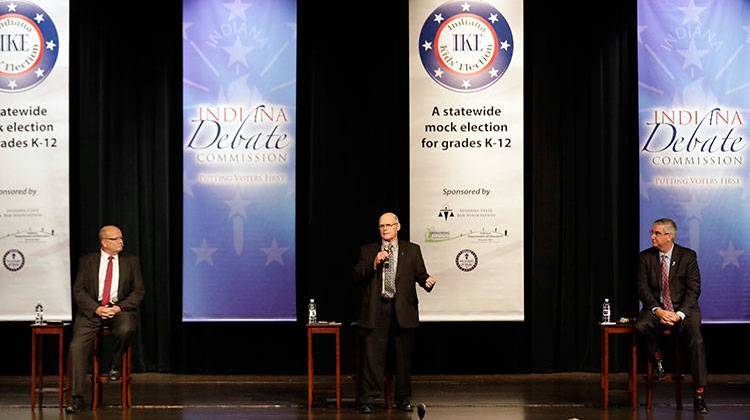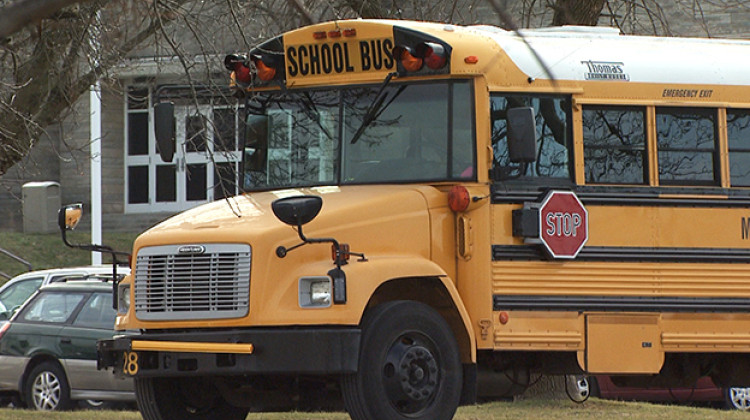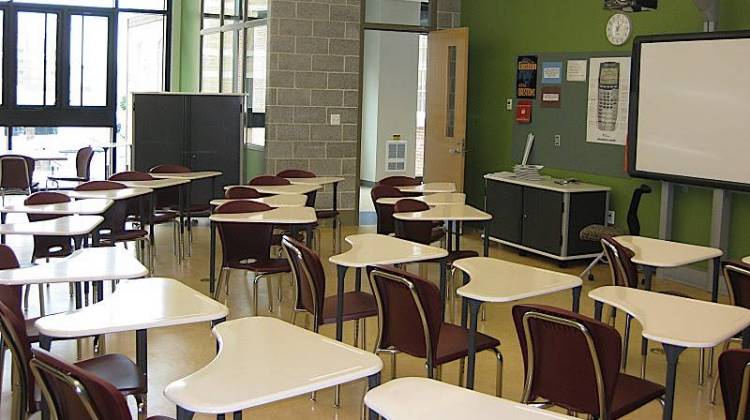
Democrat John Gregg, Libetarian Rex Bell and Republican Eric Holcomb took the stage at Lawrence North High School for the first of three scheduled gubernatorial debates.
AP Photo/Darron Cummings, PoolThe Monday’s town hall-style gubernatorial debate focused on education, and took place at Indianapolis’ Lawrence North High School, in front of an audience of students, teachers and administrators.
It featured questions from Indianapolis high school students and moderator Laura Merrifield Albright, an assistant professor of political science at the University of Indianapolis.
Republican candidate Eric Holcomb, Democratic candidate John Gregg and Libertarian candidate Rex Bell faced questions on standardized testing, Indiana’s teacher shortage, youth job availability and higher education. They laid out similar policy positions on almost all issues.
On almost all issues, Holcomb and Gregg walked similar lines: both called the ISTEP+ standardized test a broken test (the test is currently being replaced), both refrained from committing to in-state tuition at public universities for students living in the country illegally, and both were quick to say they honor the performing arts.
WATCH: 2016 Indiana Gubernatorial Debate from Lawrence North High School
Bell stood out from the group by continually advocating for local control over issues — even suggesting that school districts would be better off if each had their own test. Parents, he says, not the state, should hold schools accountable for doing a good job.
The most substantive differences between candidates emerged when they spoke about education in the context of the larger economy.
Holcomb says education is improving in Indiana. He credits the economic recovery ushered in under the former Gov. Mitch Daniel’s administration, of which he was a part.
“We ushered in Indiana’s comeback,” Holcomb says. “We turned this state around.”
But Gregg challenged Holcomb’s economic claims, pushing the Republican candidate on the cost of the recovery. He says the middle and working class are still struggling.
“The reality is that Hoosiers are working harder and harder, and taking home less and less,” Gregg says, comparing Indiana’s economy to a broken house.
“When I have a leaky roof, I fix it,” Gregg says.
The candidates also clashed briefly over Indiana’s teacher shortage. Gregg says the state bears the blame for the shortage.
“It’s teaching to the test, it’s the flat salaries, it’s the total lack of respect — I mean blaming teachers, basically, for society today,” Gregg says. “I do think once we give them a seat at the table and a modicum of respect, that will help with retention.”
Holcomb acknowledged the shortage, but called it a national problem, not a local one.
“It is not just Indiana-centric, this is a national issue,” Holcomb says. “There are 60,000 positions that look to be unfilled across the entire country. So it’s not just an Indiana issue.”
Bell blamed state testing for driving teachers from the profession. He says local control and local tests would remedy the shortage.
Gregg and Holcomb have laid out separate education plans that call for differing expansions of state-funded preschool and have different views of school choice, like vouchers and charter schools. No questions were asked specifically on those topics, but both candidates weighed in.
Holcomb wants to expand the state’s existing preschool pilot program. It offers state-funded preschool to families within certain income limits. He also says he will continue to advocate for a school funding formula where state money follows students and many families are allowed to choose between public, charter and private schools.
Gregg supports state-funded preschool options for all families in the state, regardless of income. He says the state has funds that could be used to roll that out over the course of three years.
 DONATE
DONATE






 View More Programs
View More Programs


 Support WFYI. We can't do it without you.
Support WFYI. We can't do it without you.